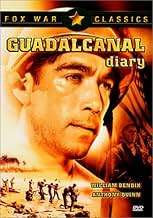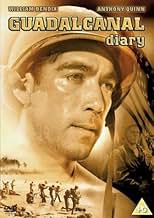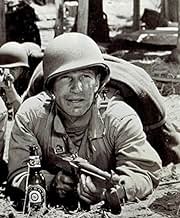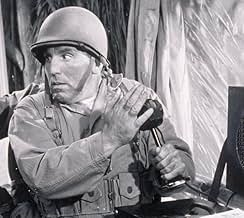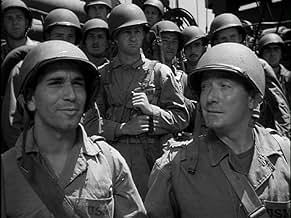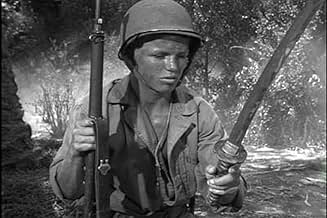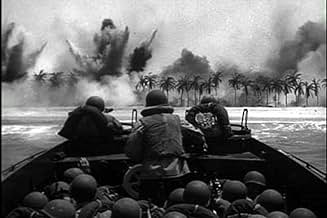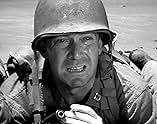IMDb RATING
6.6/10
2.4K
YOUR RATING
The story of a large U.S. Marines invasion task force bound for Guadalcanal in the Solomon Islands in 1942.The story of a large U.S. Marines invasion task force bound for Guadalcanal in the Solomon Islands in 1942.The story of a large U.S. Marines invasion task force bound for Guadalcanal in the Solomon Islands in 1942.
- Awards
- 1 win total
Eddie Acuff
- Pvt. Tex Mcllvoy
- (uncredited)
Warren Ashe
- Col. Morton
- (uncredited)
Martin Black
- Marine
- (uncredited)
Marion Carl
- Marine Pilot
- (uncredited)
Harry Carter
- Dispatch Officer
- (uncredited)
Tom Dawson
- Captain
- (uncredited)
Featured reviews
This is one of the better (and most topical) of Hollywood’s wartime efforts, but which seems to have been largely overlooked among the surplus of such films – possibly because it was helmed by journeyman director Seiler.
Still, the handling is entirely professional and the film makes the most of a good script by Lamar Trotti – peopled with believable characters ably portrayed by a fine cast (Preston Foster, Lloyd Nolan, Richard Conte, Anthony Quinn, Richard Jaeckel). The requisite comic relief provided by William Bendix and Lionel Stander is slightly overstated…but, then, Bendix delivers the film’s most moving speech towards the end.
The film – unavoidably jingoistic but, at the same time, realistic i.e. thankfully free of gung-ho heroics – balances taut action sequences (culminating in the so-called “Great Offensive”) with a handful of undeniably powerful, lingering images (particularly the line-up of dead U.S. marines ambushed on a beach by the devious Japanese forces). I’ll be following this with Cornel Wilde’s well-regarded BEACH RED (1967), which also deals with WWII combat in the Pacific; besides, I also own – but have yet to watch – the R2 DVD of Lewis Milestone’s contemporaneous THE PURPLE HEART (1944), which tackles similar events from a unique perspective.
Still, the handling is entirely professional and the film makes the most of a good script by Lamar Trotti – peopled with believable characters ably portrayed by a fine cast (Preston Foster, Lloyd Nolan, Richard Conte, Anthony Quinn, Richard Jaeckel). The requisite comic relief provided by William Bendix and Lionel Stander is slightly overstated…but, then, Bendix delivers the film’s most moving speech towards the end.
The film – unavoidably jingoistic but, at the same time, realistic i.e. thankfully free of gung-ho heroics – balances taut action sequences (culminating in the so-called “Great Offensive”) with a handful of undeniably powerful, lingering images (particularly the line-up of dead U.S. marines ambushed on a beach by the devious Japanese forces). I’ll be following this with Cornel Wilde’s well-regarded BEACH RED (1967), which also deals with WWII combat in the Pacific; besides, I also own – but have yet to watch – the R2 DVD of Lewis Milestone’s contemporaneous THE PURPLE HEART (1944), which tackles similar events from a unique perspective.
Hard hitting war movie about the first land offensive by the US in the Pacific Theater of War. Linking up with a US Navy battle task force in the South Pacific, in late July 1942, a US Marine troop ship gets the word that it's men are to be part of the invasion of the Japanese held Solomon Islands landing at a place called Gudalcanal.
Heading the invasion force is Marine Col.Wallace Grayson, Minor Watson, of the 1st. Marine Div. who's told to expect stiff resistance when his men hit the beach. As D-Day, August 7, 1942, approaches there's an eerie feeling among the Marines on deck that this first land battle is going to be a lot different then any thing that they could possibly imagined, they were right.
Powerhouse cast headed by Marine Chaplin Father Donnelly, Preston Foster, with tough as nails Marine Sgt. Hook Malone, Llyod Noland, and young 17 year old Richard Jackel as the baby-face and non-shaving Pvt. Johnny "Chicken" Anderson storm ashore on Gaudalcanal only to find that the Japanese are nowhere to be found and the "stiff resistance" that they expected was almost non-existent. Caught off guard and by surprise the Japanese defenders took off in the jungles and caves on the island. It's there that they waited to be reinforces by fresh Nippon army and marine units from the neighboring Japanese-held islands of Rabaul and Bouganinvillea.
With the US Marines capturing the Japanese air-field on the island, renaming it Henderson Field, and having much needed supplies flown in everything look up for the leathernecks and the battle of Guadalcanal seems just about over. The truth later turned out to be that the battle only began and would last some eight months. In the end Gaudalcanal would cost the US Marines Army and Navy some 20,000 casualties by the time it was over.
Far more realistic then most of the movies made by Hollywood in WWII about WWII "Guadalcanal Diary" keeps the action up and the the false heroics down. Making the Marines in the movie more human with real emotions and feeling about surviving the battle and coming back home when the war's finally over.
We also see the Japanese as both tough and effective, as well as cunning,soldiers not the wild-eyed and mindless fanatics were used to seeing, in the many war movies released back then. Thus giving the American public a better idea of what the men in both the US Marines and Army were fighting in the war in the Pacific.
The US Marines at first being told by a captured Japanese soldier that his unit is ready to surrender send a patrol to the off-shore island village of Matanikau only to find that the Japanese troops waiting for them. In an ambush the Japanese wiped out the entire Marine patrol, including it's commanding officer Capt. Cross ,Roy Roberts. Cpt. Alvarez, Anthony Quinn, was the only survivor who escapes by swimming out at sea. It now becomes apparent that the Japanese are not giving up that easily and the Maines dig in for the major battles that are soon to come.
In a tough sea air and land campaign the US and Japanese forces slug it out as the Japanese Navy tries to cut off reinforcements to the Marines on the Island. Leaving them isolated and sitting ducks for their massive naval and air attacks. The fighting goes on unabated until the US finally breaks through the Japanese blockade. As new Army as well as Marine unites land on the Island, and on Novermber 11, 1942 launch a major counter-attack that clears Gudalcanal of Japanese troops. The Japanese, unlike in the movie, were successfully evacuated by sea not massacred on the beaches by the Marines and GI's. Still the battle of Gudalcanal was the first of many Japanese held island taken by US forces that eventually lead to the defeat of Japan in the late summer of 1945.
With all the action and heroics in the movie the most moving scene in the film is when the Marines, underground in their bunker, are being hit by a nerve wracking and murderous Japanese naval and air bombardment. The Marines acted like you would expect to act under the same circumstances, scared and afraid. Cpl. Aloysius "Taxi" Potts, William Bendix, put it best when he says "I'm no hero I'm just a guy I've come out her because somebody had to come, I don't want no medals I just want to get this over with and go back home".
Heading the invasion force is Marine Col.Wallace Grayson, Minor Watson, of the 1st. Marine Div. who's told to expect stiff resistance when his men hit the beach. As D-Day, August 7, 1942, approaches there's an eerie feeling among the Marines on deck that this first land battle is going to be a lot different then any thing that they could possibly imagined, they were right.
Powerhouse cast headed by Marine Chaplin Father Donnelly, Preston Foster, with tough as nails Marine Sgt. Hook Malone, Llyod Noland, and young 17 year old Richard Jackel as the baby-face and non-shaving Pvt. Johnny "Chicken" Anderson storm ashore on Gaudalcanal only to find that the Japanese are nowhere to be found and the "stiff resistance" that they expected was almost non-existent. Caught off guard and by surprise the Japanese defenders took off in the jungles and caves on the island. It's there that they waited to be reinforces by fresh Nippon army and marine units from the neighboring Japanese-held islands of Rabaul and Bouganinvillea.
With the US Marines capturing the Japanese air-field on the island, renaming it Henderson Field, and having much needed supplies flown in everything look up for the leathernecks and the battle of Guadalcanal seems just about over. The truth later turned out to be that the battle only began and would last some eight months. In the end Gaudalcanal would cost the US Marines Army and Navy some 20,000 casualties by the time it was over.
Far more realistic then most of the movies made by Hollywood in WWII about WWII "Guadalcanal Diary" keeps the action up and the the false heroics down. Making the Marines in the movie more human with real emotions and feeling about surviving the battle and coming back home when the war's finally over.
We also see the Japanese as both tough and effective, as well as cunning,soldiers not the wild-eyed and mindless fanatics were used to seeing, in the many war movies released back then. Thus giving the American public a better idea of what the men in both the US Marines and Army were fighting in the war in the Pacific.
The US Marines at first being told by a captured Japanese soldier that his unit is ready to surrender send a patrol to the off-shore island village of Matanikau only to find that the Japanese troops waiting for them. In an ambush the Japanese wiped out the entire Marine patrol, including it's commanding officer Capt. Cross ,Roy Roberts. Cpt. Alvarez, Anthony Quinn, was the only survivor who escapes by swimming out at sea. It now becomes apparent that the Japanese are not giving up that easily and the Maines dig in for the major battles that are soon to come.
In a tough sea air and land campaign the US and Japanese forces slug it out as the Japanese Navy tries to cut off reinforcements to the Marines on the Island. Leaving them isolated and sitting ducks for their massive naval and air attacks. The fighting goes on unabated until the US finally breaks through the Japanese blockade. As new Army as well as Marine unites land on the Island, and on Novermber 11, 1942 launch a major counter-attack that clears Gudalcanal of Japanese troops. The Japanese, unlike in the movie, were successfully evacuated by sea not massacred on the beaches by the Marines and GI's. Still the battle of Gudalcanal was the first of many Japanese held island taken by US forces that eventually lead to the defeat of Japan in the late summer of 1945.
With all the action and heroics in the movie the most moving scene in the film is when the Marines, underground in their bunker, are being hit by a nerve wracking and murderous Japanese naval and air bombardment. The Marines acted like you would expect to act under the same circumstances, scared and afraid. Cpl. Aloysius "Taxi" Potts, William Bendix, put it best when he says "I'm no hero I'm just a guy I've come out her because somebody had to come, I don't want no medals I just want to get this over with and go back home".
Considering that this was a WWII movie released in 1943,while the war was still going and a ways from being resolved,this movie was probably as effective and convincing as you were going to get for the period. Certainly,given the state of the nation's need to keep the national morale up for the war effort,anything too graphic or too gritty would(besides probably raise the dander of the censorship standards of the day)probably would've deflated the efforts to get stateside citizenry to buying war bonds,cutting usage of certain products(metals come first to mind)and probably would've helped undercut the Roosevelt administrations efforts to keep the war push at the rate it was going. If it's too soft,it becomes mostly jingoistic and loses just about all of the entertainment value it could possibly have. Fortunately(perhaps by design,maybe not),the makers of this movie were able to strike the right--if perhaps unremarkable--balance.
Being a grandchild of the generations being showcased here(erstwhile known by some as "The Greatest Generation"),I have only stories told or written about the two theaters of war effort,not to mention the movies. Of course,as more years would pass between the conclusion of that war,the movies that would be made(many of them sprung from books)would become grittier,harsher,a little less glossy or idealistic,and ultimately,more graphically violent. THerefore,I(And I'm guessing many of my generation)could view this movie somewhat jadedly: the dialog is so simple and full of gaps that it almost feels like it could be parodied on Mystery Science Theatre 3000,add in the fact that many of the "kills" and soldiers dropping dead are noticeably staged and forced looking and you have a film that might have a hard time being instantly compelling to people who've seen things ranging from The Great EScape to Saving Private Ryan. Still,there ARE saving graces to this movie that make it stand the test of time:
--The earnest and no-nonsense portrayal of battle and the basic emotions between MArines,from deployment aboard a battleship carrier,right on through the two month battle to claim and seal off the island,is honest enough that anyone who's been through battle,known someone who has been(or still is)at war can feel some common relationship with the characters in the film. Some poignant lines are spoken by the perceived comic relief of the film(a brash,slightly dense private from Brooklyn played by luggish William Bendix)and the wise yet quietly strong chaplain(Preston Brooks),among others,to give this film some heft and
--The battle scenes are concise and tight,showcasing plenty of gunfire,explosions,bombings and other various forms of combat violence WITHOUT being tedious or trivial. They are not neat,pretty or always with the desirable outcomes,but they are neither futile nor random.
MOst of the characters here seem like composites,no doubt probably an amalgam of (Mostly)young MArines and Army men that script co-writer(with Lamar Trotti) and book source writer Richard Tregaskis met while covering the Pacific Theatre of Operations in the war. I imagine there was pressure on the studio and director Lewis Seiler to crank out this film as fast as possible to stoke the fires of stateside interest in the war effort,so if the finished product doesn't exactly shine,I think he and the people making this movie can be forgiven. All in all,this is a film to recommend for those who are curious about movies set around WWII,particularly films about it that are IN the moment,when America was only able to have so much perspective on it.
Being a grandchild of the generations being showcased here(erstwhile known by some as "The Greatest Generation"),I have only stories told or written about the two theaters of war effort,not to mention the movies. Of course,as more years would pass between the conclusion of that war,the movies that would be made(many of them sprung from books)would become grittier,harsher,a little less glossy or idealistic,and ultimately,more graphically violent. THerefore,I(And I'm guessing many of my generation)could view this movie somewhat jadedly: the dialog is so simple and full of gaps that it almost feels like it could be parodied on Mystery Science Theatre 3000,add in the fact that many of the "kills" and soldiers dropping dead are noticeably staged and forced looking and you have a film that might have a hard time being instantly compelling to people who've seen things ranging from The Great EScape to Saving Private Ryan. Still,there ARE saving graces to this movie that make it stand the test of time:
--The earnest and no-nonsense portrayal of battle and the basic emotions between MArines,from deployment aboard a battleship carrier,right on through the two month battle to claim and seal off the island,is honest enough that anyone who's been through battle,known someone who has been(or still is)at war can feel some common relationship with the characters in the film. Some poignant lines are spoken by the perceived comic relief of the film(a brash,slightly dense private from Brooklyn played by luggish William Bendix)and the wise yet quietly strong chaplain(Preston Brooks),among others,to give this film some heft and
--The battle scenes are concise and tight,showcasing plenty of gunfire,explosions,bombings and other various forms of combat violence WITHOUT being tedious or trivial. They are not neat,pretty or always with the desirable outcomes,but they are neither futile nor random.
MOst of the characters here seem like composites,no doubt probably an amalgam of (Mostly)young MArines and Army men that script co-writer(with Lamar Trotti) and book source writer Richard Tregaskis met while covering the Pacific Theatre of Operations in the war. I imagine there was pressure on the studio and director Lewis Seiler to crank out this film as fast as possible to stoke the fires of stateside interest in the war effort,so if the finished product doesn't exactly shine,I think he and the people making this movie can be forgiven. All in all,this is a film to recommend for those who are curious about movies set around WWII,particularly films about it that are IN the moment,when America was only able to have so much perspective on it.
This is a tremendous World War II film with amazing performances. The director, Lewis Seiler, and the writer of the screenplay, Lamar Trotti, must have really been on their toes to come up with this little gem from a book by Richard Tregaskis. The quality of "Guadalcanal" is amazing from the special effects and location shots to the cinematography and the dialogue. Sometimes less is more and this movie demonstrates that in portraying the violence of war realistically without being extremely graphic. The only minor flaw I saw in the special effects was when a few soldiers were killed by grenades or bombs and they seemed to fall over from the blast a tad bit too quickly. This movie uses an ensemble cast of actors to tell the story of a platoon of U.S. marines sent to Guadalcanal to fight the Japanese in the South Pacific Ocean. The focus is not as much on the fighting and battles as it is on the men themselves in the context of war, although there are several terrific scenes of fighting and skirmishes that propel the movie along at an excellent pace. "Guadalcanal" is in glorious black and white film and is crisp and clear. Many scenes from the movie are so vivid that they have lingered in my mind long after watching the movie. I can recall vividly the palm trees on the beach, the sound of the men singing, the men lounging on the deck of the ship, Japanese soldiers being blown up in a cave and falling out of trees, the faces and expressions of the men and on and on. This movie not only stood up to a second viewing but also seemed even better the second time around. I can't praise the actors enough who breathe life into this movie and who make their characters so easy to get to know that this sixty year old movie seems like it was made yesterday. Watch this movie and see how these men respond to battle in "Guadalcanal." It's an experience not to be missed. I highly recommend it and give it a 92/100. I purchased the DVD for my collection.
I can't be offended by the truth, and the truth is, GIs called the enemy in the South Pacific "Japs," "Slant-eyes," and a lot worse. If that offends anyone, then why watch a film that you know is about a bloody WWII battle, where passions were running high? After the Marine shoots the Japanese sniper out of the tree, would it have been less offensive if he would have said, "Well, I just dispatched another one of the Asian enemy." Really! I can just imagine what someone would say in the heat of battle. It'd be a hell of a lot more descriptive than "Slant-eye."
As for the nameless reviewer who criticized the scene wherein the GI did not get mail, I can tell you first hand, that there were fewer sights more pathetic than the guys standing there after mailcall without a single letter in their hand. It was hard to watch. We all felt for those guys. You knew what they were going through, yet you couldn't do a damn thing to help them. I know how I felt when days went by without a letter from home--from ANYONE. Being in combat in a foreign land must have made it exponentially worse. I would bet that the reviewer who made that criticism never spent one day in his country's service.
As for the nameless reviewer who criticized the scene wherein the GI did not get mail, I can tell you first hand, that there were fewer sights more pathetic than the guys standing there after mailcall without a single letter in their hand. It was hard to watch. We all felt for those guys. You knew what they were going through, yet you couldn't do a damn thing to help them. I know how I felt when days went by without a letter from home--from ANYONE. Being in combat in a foreign land must have made it exponentially worse. I would bet that the reviewer who made that criticism never spent one day in his country's service.
Did you know
- TriviaMarine Corps Capt. Marion Carl, a multi-ace (18.5 air victories), makes an appearance as a Marine Corps pilot. Capt. Carl wears his baseball cap with the bill pointed skyward and makes the comment, "Don't look now, fellas, but a truck of gas just came on the field." Capt. Carl was a survivor of the Battle of Midway and the air campaign for Guadalcanal in 1942. He was awarded 2 Navy Crosses for his actions at Midway and Guadalcanal. Sadly, on June 28, 1998, he was murdered in his Oregon home by a home intruder.
- GoofsWhen Japanese snipers hid in the tops of trees, they tied themselves into their positions. They did not fall out of the trees when shot.
- Quotes
Cpl. Aloysius T. 'Taxi' Potts: [In dugout waiting out a heavy artillery barrage] I don't mind the one with my name on it. It's the one that says, 'To whom it may concern' that I don't like.
[after the barrage increases]
Cpl. Aloysius T. 'Taxi' Potts: They're throwing everything at us but the kitchen stove.
Gunnery Sgt. Hook Malone: [after an even louder explosion] That's the stove now!
- Crazy creditsThe film's opening prologue in the preface of a book states: A new chapter in the history of America by a correspondent who landed on Guadalcanal with the first detachment of United States Marines.
- ConnectionsEdited into Tarawa Beachhead (1958)
- SoundtracksMarine Hymn
(uncredited)
Music by Jacques Offenbach from "Geneviève de Brabant"
Played during the opening credits and occasionally in the score
- How long is Guadalcanal Diary?Powered by Alexa
Details
- Release date
- Country of origin
- Language
- Also known as
- Richard Tregaskis' Guadalcanal Diary
- Filming locations
- Production company
- See more company credits at IMDbPro
- Runtime1 hour 33 minutes
- Color
- Aspect ratio
- 1.37 : 1
Contribute to this page
Suggest an edit or add missing content



